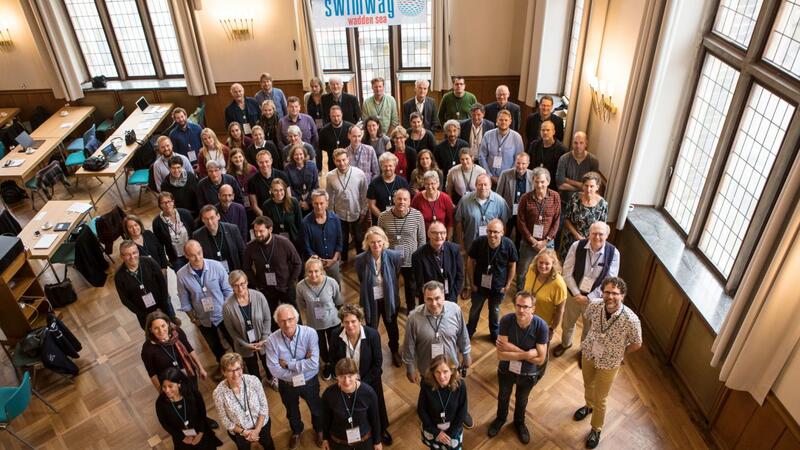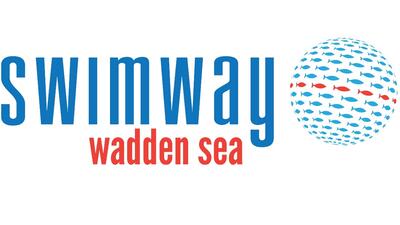Hamburg hosts first international Swimway conference on migrating fish

What are drivers of fish populations that utilize coastal marine environments during their life cycle? What are potential bottlenecks? And do current management measures reduce those risks effectively? Those are among the central questions the first international Swimway conference focused on. On 24-26 September 2019 in Hamburg, Germany, about 90 scientists, managers, policy makers, NGOs and other stakeholders concerned with fish in coastal areas participated in the event and seized this as forum to explore opportunities for cooperation and protection of migrating fish. The event was organized by the “Working Group Swimway” (WG-Swimway) of the Trilateral Wadden Sea Cooperation (TWSC) in cooperation with the Common Wadden Sea Secretariat (CWSS).
“The Wadden Sea is an important stage in the life cycles of many fish that use this coastal marine environment as kindergarten”, says Adi Kellermann (Kellermann-Consultants), Chairperson of WG-Swimway and Coordinator of the Swimway Initiative. “However, we still have gaps in research, which we aim to identify and fill at this conference. We also took the opportunity to encourage marine scientists, especially those early in their career to engage in exploring the ecology and life cycles of migrating fishes.
Kellermann opened the conference together with the event’s local organiser Andreas Dänhardt, Klaus Janke, Head of the National Park Authority “Hamburgisches Wattenmeer” as well as Karin Lochte, Chairperson of the TWSC’s Wadden Sea Board and the Allianz Deutsche Meeresforschung. “This conference helps to initiate research collaboration to implement the SWIMWAY vision as it can only be achieved through concerted action”, says Lochte. Klaus Janke, D Director of the National Park Hamburg Wadden Sea added that Swimway” is an important programme to fill knowledge gaps concerning a wise and sustainable management and protection of fish in the Wadden Sea. I very much like the approach to promote SWIMWAY on a trilateral basis, in analogy to what has already been successfully implemented for the birds and their East Atlantic Flyway.” This year the Wadden Sea celebrates the 10th anniversary of its inscription on the World Heritage List with various events, among them this conference.
The conference was held in four sessions, each introduced by a keynote speech. Katja Philippart of the Dutch Royal Institute for Sea Research (NIOZ) opened the theme “Monitoring and Data”. Josianne G. Støttrup (with co-authors Elliot J Brown and Alexandros Kokkalis) of the Danish DTU Aqua introduced “Fish habitats”. The keynote to the session on “Life cycles (Swimways)” was given by Axel Temming from the Institute of Marine Ecosystem and Fishery Science at the University of Hamburg, Germany. Mike Elliott from the UK-based Institute of Estuarine and Coastal Studies of the University of Hull opened the theme “Marine Policy”.
In addition to the sessions, Anja Szczesinski, WWF Germany and Coordinator of the International Wadden Sea School, held a workshop on education. Furthermore, breakout sessions provided room for extended discussion amongst participants. In the latter, ideas for trilateral projects were brought together, and the trilateral and international network on fish was strengthened.
In their closing speech, Josianne Sttøttrup and Mike Elliot highlighted a plethora of recommendations and suggestions for the future actions within the SWIMWAY programme.
In the course of three days a total of 24 expert talks, an opening keynote and four session keynotes as well as poster presentations were given. “We were immensely pleased with the level of excellence and diversity of topics addressed by the various talks”, says Kellermann. The proceedings of the conference will be published in a special issue of the Elsevier Journal “Estuarine, Coastal and Shelf Science”.
The conference is one of the first activities for implementation of the recently adopted Trilateral Wadden Sea Swimway Vision Action Programme, which aims at elevating migrating fish as priority in policies concerning their habitat and deliver robust science for developing a vision for a sustainable future for migrating fish. The event was supported by the Danish Ministry for Environment and Food, the German Federal Ministry for the Environment, Nature Conservation and Nuclear Safety and the Dutch Ministry of Agriculture, Nature and Food Quality.

